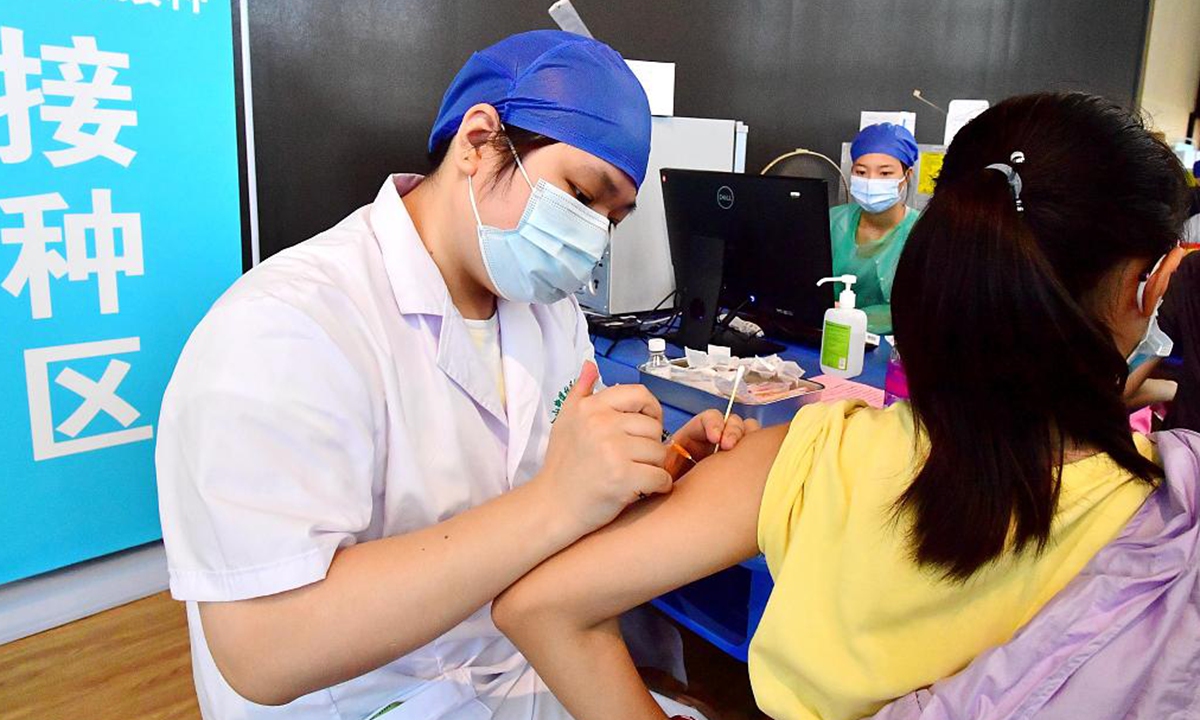
A teenager is being vaccinated with COVID-19 vaccine in Fuzhou, East China's Fujian Province on August 3, 2021. Photo: CFP
Chinese parents and experts call for enhanced vaccination for elementary and middle school students and safe vaccines suitable for children under 12. The demand came as the first school outbreak in Putian, East China's Fujian Province, highlighted the urgency of vaccinating students and children in the country.
The number of positive infections in
the latest flare-up in Putian soared on Tuesday to 94, including 75 confirmed cases and 19 asymptomatic cases. Thirty of the infected are children under the age of 10, a group, for which the mass COVID-19 vaccination has not started yet .
According to media reports, the disease prevention and control authorities in Putian had enhanced vaccination work for students aged between 12 and 17 amid the outbreak. Those aged between 3 and 11 would gradually be included in the vaccination work although there is not a clear timetable.
China's three inactivated COVID-19 vaccines produced by Sinopharm and Sinovac have proved to be effective for children aged 3 to 17 and have been approved for emergency use on that age group. However, as the Chinese national health authority implements a gradual and periodical vaccination strategy, the country now only provides vaccines to population aged between 12 and 17.
The Global Times learned from Sinovac on Tuesday that the use of the vaccines on children under 12 has not started yet despite the new cases in a Putian elementary school.
A retired staff from Nandamen Kindergarten at the Xianyou county in Putian, told the Global Times on Tuesday that the city had suspended classes for elementary and secondary schools. Residents are also taking the second of three required rounds of nucleic acid tests.
Many aged between 12 and 17 received their first shot of COVID-19 vaccine in late August, before the latest outbreak in the province, according to the staff.
The Global Times also learned from an employee of the Licheng district's center for disease control and prevention in Putian that grassroots-level health authorities would quickly roll out the vaccination for children aged between 3 and 11 once the higher authorities approve the use of COVID-19 vaccines on that age group.
But many experts and parents of children between 3 and 11 have expressed concerns and are looking forward to having safe and effective shots available for their children.
A netizen expressed worries on China's Twitter-like Sina Weibo that the Delta coronavirus variant may infect more younger children given that the new semester has just begun nationwide. Despite the massive vaccination of children between 12 and 17, the vaccination for those under 12 remains undetermined. It is necessary to develop vaccines targeting children under 12.
Yang Zhanqiu, a virologist from Wuhan University, told the Global Times on Monday that Putian infections will raise the willingness of people to have their children vaccinated, and facts have proven that getting vaccinated could slow the spread of the disease.
In response to concerns over the safety of the vaccines for minors, Tao Lina, a Shanghai-based medical expert on vaccines, told the Global Times that inactivated vaccines are very safe for children and have been largely used in vaccinations for that age group.
Tao warned that even young children have a strong immune system that can prevent them from developing serious symptoms after infection. They probably would infect the elderly members in their families and these elderly people are on high risk of getting seriously ill with the coronavirus.
After the authorization for use on adults, the Sinopharm and Sinovac vaccines were proved to be safe for the 3 to 17 age group after clinical trials and expert reviews, and were authorized for emergency use by that age group by the relevant authorities, officials revealed in June.
According to Phase II of the clinical trials,
Sinovac's COVID-19 vaccine is at least 98.9 percent effective in producing antibodies in that age group, a higher efficacy than in population over 18 years old.




